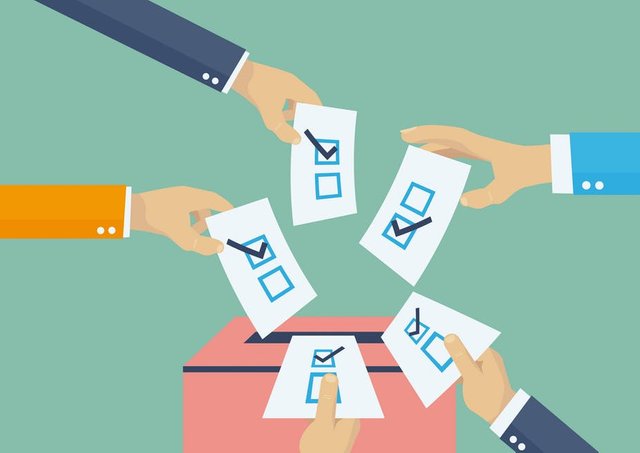How Blockchain Technology Can Help The Future of Political Election?
This article is based on article in Medium by Kukuh T Wicaksono. The original article is Indonesia, and I try my best to summarize a few important points from the article.
ORIGINAL ARTICLE HERE
https://medium.com/@kukuhtw/bagaimana-blockchain-dapat-membantu-pemilihan-umum-36f5495c4940
So, according to Mr. Kukuh in the future Blockchain technology will be very useful to holding a fair and transparent election.

The conventional election system right now are:
First, the country creates population database and select the eligible voters based on some requirements such as nationality, and usually age. This database usually centralized in some kind of government server.
Second, the voters must register in their own county, he/she CANNOT register more than county to vote. This is important to prevent double votes from one voter.
Third, in some countries like Indonesia, people still do the vote manually with ballot paper. They have to come in some election center and wait for their number being called up to voting booth.
Fourth, after finish, usually there will be a vote counting and being witnessed by the locals or government witness and also non-profit organization and press to avoid cheating.
Fifth, the result from each county will be reported to the central election center. And than the total database will be counted in the final vote count to find out the winner.
Now, this is where the blockchain technology will play its vital role. But, first the government must change the technology from manual to digital if they want to implement blockchain technology.
First, blockchain technology will distribute the database of all eligible voters to ALL of county election center. So, there will be no centralized center.
Second, every vote that is already in the ballot will be timestamp using hashing or witness technology just like when you do the transaction in cryptocurrency such as bitcoin. And because all the county already have the database, they can easily found if there are any double votes or some kind of voting manipulation.
Third, the risk of getting hacked is getting smaller because there are no centralized data.
Fourth, there will be realtime update, because all the county hold their own database which are connected via blockchain technology.
BUT, although this sounds really promising in the real world, there are still many challenges ahead. The example is when Agora, a blockchain startup which proposes the use of blockchain in election proclaimed in March 2018, that they successfully implemented the technology in Sierra Leone Election, the fact is Agora ONLY helping to store the result of election and only play as international observer, and not as the main platform for the election itself.
Agora statement can be found here:
https://medium.com/agorablockchain/agora-official-statement-regarding-sierra-leone-election-7730d2d9de4e
Sierra Leone denial of blockchain technology can be found here:
https://techcrunch.com/2018/03/19/sierra-leone-government-denies-the-role-of-blockchain-in-its-recent-election/
So, in the near future there will be many skepticism about 'Blockchain Election' which maybe reasonable to consider.
But in the long run maybe blockchain IS the best way to give it the real voting power to the people in more responsible, easy and transparent way.